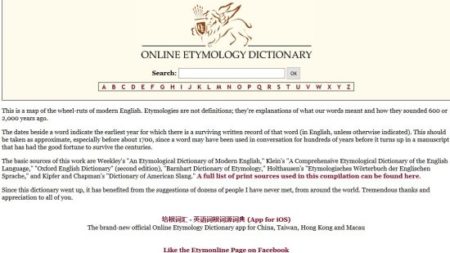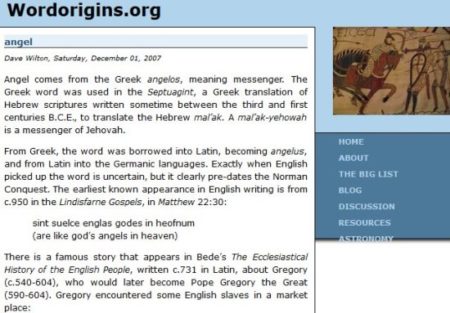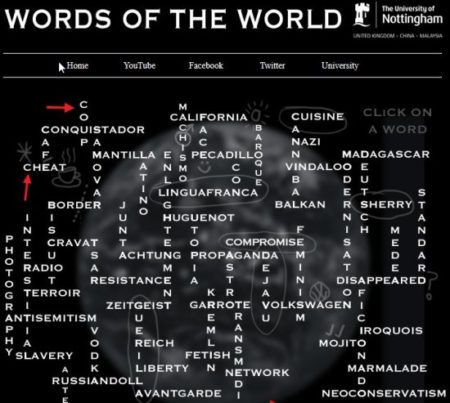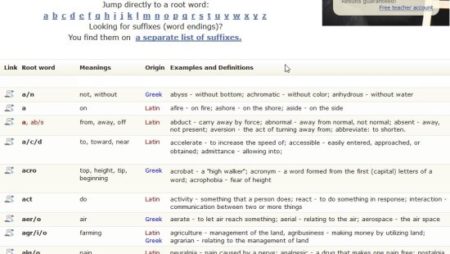We use different languages worldwide to communicate with each other. Every so often we wonder where a word came from. How did a particular word start being used as a common word worldwide and where did it actually originate from. So to find this out we will explore the world of languages and origin of words in this article. This article will cover websites which will let you know the origin of a word.
The study of origin of a word is known as Etymology. You will find that often there are popular tales behind the origin of a word. Most of these tales are just tales and not true, but knowing how the word came into being is equally interesting. So let’s look at these websites to know the origin of words below.
Online Etymology Dictionary
Online etymology dictionary explains you the origin of words and what they meant along with how they would have sounded years back. You would see a date beside each word. This date represents the earliest evidence of this word being used in some sort of written manuscript. Now you can either search for a word you are looking for by typing it in the search box given at the top of the page, otherwise you can browse the words alphabetically. The website has a huge collection of words in it. You can go through the words and find out there origins and meanings as well.
Word Origins by English Oxford Living Dictionaries
Word Origins by English Oxford Living Dictionaries is a good website to know about a words origin. You can check out origin of a word or a phrase. You can search for the word or a phrase you are looking for or can even browse the page to know origin of different words. The website apart from this has a dictionary, thesaurus, grammar helper, etc. As this app has a dictionary, it proves to be a good source for knowing the origin of a word. You can see trending words when you scroll down the page. You can also subscribe to the newsletter on this website to receive updates regarding new words, phrases, etc.
Wordorigins.org
The website Wordorigins.org will let you know the origin of words and phrases. The website has a big list of words which you can go through, or even search for a particular word that you are looking for. The website also has a blog and discussion forum where people can discuss there views. You can login and become a member of the website so you receive regular updates from the website. You can either start browsing words by going to the big list words tab, or by searching for a word. The big list of words is in alphabetical order and there are about 400 words in here. Each word has a interesting story or folklore related to it.
Words of the World
Words of the World is a website which lets you watch videos to let you know the origin of a word. The website explains which language a word originated from through a video. The home page of the website will have a list of words for which you can see a video explaining how the word originated. The words on the home page are given in the format as shown in the screenshot above, but they can also be turned into a neat list if you like. The website is supported by the University of Nottingham and thus is a trusted source.
Learning Nerd
Learning Nerd is another website which has a section on English etymology resources. The website lists references to origin of words like there are word origin dictionaries listed, words with Greek and Latin roots are under a different category, words originating from around the world can be found under international words, and then there is a section for miscellaneous words. You can also play etymology quizzes and listen to etymology podcasts as well. The website itself doesn’t have much information about word origins but will redirect you to another website for your word needs.
Learn That Word
Learn That Word is another website which lists root words and prefixes. The website is pretty basic and a list of words can be seen right on the first page. The words are listed alphabetically, so you can even jump to a word that you are looking for easily. The website will list the root word, its meaning, its place of origin, and then definition and examples. This can be seen in the screenshot above.
These are the websites I found which let you know the origin of a word. Go through them and let me know which one you liked most. If you think there is a website which could be included in this article then leave a comment below.
From Wikipedia, the free encyclopedia
«Etymologies» redirects here. For the work by Isidore of Seville, see Etymologiae.
Etymology ( ET-im-OL-ə-jee[1]) is the study of the origin and evolution of a word’s semantic meaning across time, including its constituent morphemes and phonemes.[2][3] It is a subfield of historical linguistics, and draws upon comparative semantics, morphology, semiotics, and phonetics.
For languages with a long written history, etymologists make use of texts, and texts about the language, to gather knowledge about how words were used during earlier periods, how they developed in meaning and form, or when and how they entered the language. Etymologists also apply the methods of comparative linguistics to reconstruct information about forms that are too old for any direct information to be available. By analyzing related languages with a technique known as the comparative method, linguists can make inferences about their shared parent language and its vocabulary. In this way, word roots in many European languages, for example, can be traced all the way back to the origin of the Indo-European language family.
Even though etymological research originated from the philological tradition, much current etymological research is done on language families where little or no early documentation is available, such as Uralic and Austronesian.
Etymology[edit]
The word etymology derives from the Greek word ἐτυμολογία (etumología), itself from ἔτυμον (étumon), meaning «true sense or sense of a truth», and the suffix -logia, denoting «the study of».[4][5]
The term etymon refers to a word or morpheme (e.g., stem[6] or root[7]) from which a later word or morpheme derives. For example, the Latin word candidus, which means «white», is the etymon of English candid. Relationships are often less transparent, however. English place names such as Winchester, Gloucester, Tadcaster share in different modern forms a suffixed etymon that was once meaningful, Latin castrum ‘fort’.
Diagram showing relationships between etymologically related words
Methods[edit]
Etymologists apply a number of methods to study the origins of words, some of which are:
- Philological research. Changes in the form and meaning of the word can be traced with the aid of older texts, if such are available.
- Making use of dialectological data. The form or meaning of the word might show variations between dialects, which may yield clues about its earlier history.
- The comparative method. By a systematic comparison of related languages, etymologists may often be able to detect which words derive from their common ancestor language and which were instead later borrowed from another language.
- The study of semantic change. Etymologists must often make hypotheses about changes in the meaning of particular words. Such hypotheses are tested against the general knowledge of semantic shifts. For example, the assumption of a particular change of meaning may be substantiated by showing that the same type of change has occurred in other languages as well.
Types of word origins[edit]
Etymological theory recognizes that words originate through a limited number of basic mechanisms, the most important of which are language change, borrowing (i.e., the adoption of «loanwords» from other languages); word formation such as derivation and compounding; and onomatopoeia and sound symbolism (i.e., the creation of imitative words such as «click» or «grunt»).
While the origin of newly emerged words is often more or less transparent, it tends to become obscured through time due to sound change or semantic change. Due to sound change, it is not readily obvious that the English word set is related to the word sit (the former is originally a causative formation of the latter). It is even less obvious that bless is related to blood (the former was originally a derivative with the meaning «to mark with blood»).
Semantic change may also occur. For example, the English word bead originally meant «prayer». It acquired its modern meaning through the practice of counting the recitation of prayers by using beads.
History[edit]
The search for meaningful origins for familiar or strange words is far older than the modern understanding of linguistic evolution and the relationships of languages, which began no earlier than the 18th century. From Antiquity through the 17th century, from Pāṇini to Pindar to Sir Thomas Browne, etymology had been a form of witty wordplay, in which the supposed origins of words were creatively imagined to satisfy contemporary requirements; for example, the Greek poet Pindar (born in approximately 522 BCE) employed inventive etymologies to flatter his patrons. Plutarch employed etymologies insecurely based on fancied resemblances in sounds. Isidore of Seville’s Etymologiae was an encyclopedic tracing of «first things» that remained uncritically in use in Europe until the sixteenth century. Etymologicum genuinum is a grammatical encyclopedia edited at Constantinople in the ninth century, one of several similar Byzantine works. The thirteenth-century Legenda Aurea, as written by Jacobus de Varagine, begins each vita of a saint with a fanciful excursus in the form of an etymology.[8]
Ancient Sanskrit[edit]
The Sanskrit linguists and grammarians of ancient India were the first to make a comprehensive analysis of linguistics and etymology. The study of Sanskrit etymology has provided Western scholars with the basis of historical linguistics and modern etymology. Four of the most famous Sanskrit linguists are:
- Yaska (c. 6th–5th centuries BCE)
- Pāṇini (c. 520–460 BCE)
- Kātyāyana (6th-4th centuries BCE)
- Patañjali (2nd century BCE)
These linguists were not the earliest Sanskrit grammarians, however. They followed a line of ancient grammarians of Sanskrit who lived several centuries earlier like Sakatayana of whom very little is known. The earliest of attested etymologies can be found in Vedic literature in the philosophical explanations of the Brahmanas, Aranyakas, and Upanishads.
The analyses of Sanskrit grammar done by the previously mentioned linguists involved extensive studies on the etymology (called Nirukta or Vyutpatti in Sanskrit) of Sanskrit words, because the ancient Indians considered sound and speech itself to be sacred and, for them, the words of the sacred Vedas contained deep encoding of the mysteries of the soul and God.
Ancient Greco-Roman[edit]
One of the earliest philosophical texts of the Classical Greek period to address etymology was the Socratic dialogue Cratylus (c. 360 BCE) by Plato. During much of the dialogue, Socrates makes guesses as to the origins of many words, including the names of the gods. In his Odes Pindar spins complimentary etymologies to flatter his patrons. Plutarch (Life of Numa Pompilius) spins an etymology for pontifex, while explicitly dismissing the obvious, and actual «bridge-builder»:
The priests, called Pontifices…. have the name of Pontifices from potens, powerful because they attend the service of the gods, who have power and command overall. Others make the word refer to exceptions of impossible cases; the priests were to perform all the duties possible; if anything lays beyond their power, the exception was not to be cavilled. The most common opinion is the most absurd, which derives this word from pons, and assigns the priests the title of bridge-makers. The sacrifices performed on the bridge were amongst the most sacred and ancient, and the keeping and repairing of the bridge attached, like any other public sacred office, to the priesthood.
Medieval[edit]
Isidore of Seville compiled a volume of etymologies to illuminate the triumph of religion. Each saint’s legend in Jacobus de Varagine’s Legenda Aurea begins with an etymological discourse on the saint’s name:
Lucy is said of light, and light is beauty in beholding, after that S. Ambrose saith: The nature of light is such, she is gracious in beholding, she spreadeth over all without lying down, she passeth in going right without crooking by right long line; and it is without dilation of tarrying, and therefore it is showed the blessed Lucy hath beauty of virginity without any corruption; essence of charity without disordinate love; rightful going and devotion to God, without squaring out of the way; right long line by continual work without negligence of slothful tarrying. In Lucy is said, the way of light.[9]
Modern era[edit]
Etymology in the modern sense emerged in the late 18th-century European academia, within the context of the wider «Age of Enlightenment,» although preceded by 17th century pioneers such as Marcus Zuerius van Boxhorn, Gerardus Vossius, Stephen Skinner, Elisha Coles, and William Wotton. The first known systematic attempt to prove the relationship between two languages on the basis of similarity of grammar and lexicon was made in 1770 by the Hungarian, János Sajnovics, when he attempted to demonstrate the relationship between Sami and Hungarian (work that was later extended to the whole Finno-Ugric language family in 1799 by his fellow countryman, Samuel Gyarmathi).[10]
The origin of modern historical linguistics is often traced to Sir William Jones, a Welsh philologist living in India, who in 1782 observed the genetic relationship between Sanskrit, Greek and Latin. Jones published his The Sanscrit Language in 1786, laying the foundation for the field of Indo-European linguistics.[11]
The study of etymology in Germanic philology was introduced by Rasmus Christian Rask in the early 19th century and elevated to a high standard with the German Dictionary of the Brothers Grimm. The successes of the comparative approach culminated in the Neogrammarian school of the late 19th century. Still in the 19th century, German philosopher Friedrich Nietzsche used etymological strategies (principally and most famously in On the Genealogy of Morals, but also elsewhere) to argue that moral values have definite historical (specifically, cultural) origins where modulations in meaning regarding certain concepts (such as «good» and «evil») show how these ideas had changed over time—according to which value-system appropriated them. This strategy gained popularity in the 20th century, and philosophers, such as Jacques Derrida, have used etymologies to indicate former meanings of words to de-center the «violent hierarchies» of Western philosophy.
Notable etymologists[edit]
- Ernest Klein (1899-1983), Hungarian-born Romanian-Canadian linguist, etymologist
- Marko Snoj (born 1959), Indo-Europeanist, Slavist, Albanologist, lexicographer, and etymologist
- Anatoly Liberman (born 1937), linguist, medievalist, etymologist, poet, translator of poetry and literary critic
- Michael Quinion (born c. 1943)
See also[edit]
- Examples
- Etymological dictionary
- Lists of etymologies
- Place name origins
- Fallacies
- Bongo-Bongo – Name for an imaginary language in linguistics
- Etymological fallacy – Fallacy that a word’s history defines its meaning
- False cognate – Words that look or sound alike, but are not related
- False etymology – Popular, but false belief about word origins
- Folk etymology – Replacement of an unfamiliar linguistic form by a more familiar one
- Malapropism – Misuse of a word
- Pseudoscientific language comparison – Form of pseudo-scholarship
- Linguistic studies and concepts
- Diachrony and synchrony – Complementary viewpoints in linguistic analysis
- Surface analysis (surface etymology)
- Historical linguistics – Study of language change over time
- Lexicology – Linguistic discipline studying words
- Philology – Study of language in oral and written historical sources
- Proto-language – Common ancestor of a language family
- Toponymy – Branch of onomastics in linguistics, study of place names
- Wörter und Sachen – science school of linguistics
- Diachrony and synchrony – Complementary viewpoints in linguistic analysis
- Processes of word formation
- Cognate – Words inherited by different languages
- Epeolatry
- Neologism – Newly coined term not accepted into mainstream language
- Phono-semantic matching – Type of multi-source neologism
- Semantic change – Evolution of a word’s meaning
- Suppletion – a word having inflected forms from multiple unrelated stems
Notes[edit]
- ^ The New Oxford Dictionary of English (1998) ISBN 0-19-861263-X – p. 633 «Etymology /ˌɛtɪˈmɒlədʒi/ the study of the class in words and the way their meanings have changed throughout time».
- ^ Etymology: The history of a word or word element, including its origins and derivation
- ^ «Etymology». www.etymonline.com.
- ^ Harper, Douglas. «etymology». Online Etymology Dictionary.
- ^ ἐτυμολογία, ἔτυμον. Liddell, Henry George; Scott, Robert; A Greek–English Lexicon at the Perseus Project.
- ^ According to Ghil’ad Zuckermann, the ultimate etymon of the English word machine is the Proto-Indo-European stem *māgh «be able to», see p. 174, Zuckermann, Ghil’ad (2003). Language Contact and Lexical Enrichment in Israeli Hebrew. Palgrave Macmillan. ISBN 978-1403917232.
- ^ According to Ghil’ad Zuckermann, the co-etymon of the Israeli word glida «ice cream» is the Hebrew root gld «clot», see p. 132, Zuckermann, Ghil’ad (2003). Language Contact and Lexical Enrichment in Israeli Hebrew. Palgrave Macmillan. ISBN 978-1403917232.
- ^ Jacobus; Tracy, Larissa (2003). Women of the Gilte Legende: A Selection of Middle English Saints Lives. DS Brewer. ISBN 9780859917711.
- ^ «Medieval Sourcebook: The Golden Legend: Volume 2 (full text)».
- ^ Szemerényi 1996:6
- ^ LIBRARY, SHEILA TERRY/SCIENCE PHOTO. «Sir William Jones, British philologist — Stock Image — H410/0115». Science Photo Library.
References[edit]
- Alfred Bammesberger. English Etymology. Heidelberg: Carl Winter, 1984.
- Philip Durkin. «Etymology», in Encyclopedia of Language and Linguistics, 2nd edn. Ed. Keith Brown. Vol. 4. Oxford: Elsevier, 2006, pp. 260–7.
- Philip Durkin. The Oxford Guide to Etymology. Oxford/NY: Oxford University Press, 2009.
- William B. Lockwood. An Informal Introduction to English Etymology. Montreux, London: Minerva Press, 1995.
- Yakov Malkiel. Etymology. Cambridge: Cambridge University Press, 1993.
- Alan S. C. Ross. Etymology, with a special reference to English. Fair Lawn, N.J.: Essential Books; London: Deutsch, 1958.
- Michael Samuels. Linguistic Evolution: With Special Reference to English. Cambridge: Cambridge University Press, 1972.
- Bo Svensén. «Etymology», chap. 19 of A Handbook of Lexicography: The Theory and Practice of Dictionary-Making. Cambridge/NY: Cambridge University Press, 2009.
- Walther von Wartburg. Problems and Methods in Linguistics, rev. edn. with the collaboration of Stephen Ullmann. Trans. Joyce M. H. Reid. Oxford: Blackwell, 1969.
External links[edit]
Look up etymology in Wiktionary, the free dictionary.
Media related to Etymology at Wikimedia Commons
- Etymology at Curlie.
- List of etymologies of words in 90+ languages.
- Online Etymology Dictionary.
The etymology of a word refers to its origin and historical development: that is, its earliest known use, its transmission from one language to another, and its changes in form and meaning. Etymology is also the term for the branch of linguistics that studies word histories.
What’s the Difference Between a Definition and an Etymology?
A definition tells us what a word means and how it’s used in our own time. An etymology tells us where a word came from (often, but not always, from another language) and what it used to mean.
For example, according to The American Heritage Dictionary of the English Language, the definition of the word disaster is «an occurrence causing widespread destruction and distress; a catastrophe» or «a grave misfortune.» But the etymology of the word disaster takes us back to a time when people commonly blamed great misfortunes on the influence of the stars.
Disaster first appeared in English in the late 16th century, just in time for Shakespeare to use the word in the play King Lear. It arrived by way of the Old Italian word disastro, which meant «unfavorable to one’s stars.»
This older, astrological sense of disaster becomes easier to understand when we study its Latin root word, astrum, which also appears in our modern «star» word astronomy. With the negative Latin prefix dis- («apart») added to astrum («star»), the word (in Latin, Old Italian, and Middle French) conveyed the idea that a catastrophe could be traced to the «evil influence of a star or planet» (a definition that the dictionary tells us is now «obsolete»).
Is the Etymology of a Word Its True Definition?
Not at all, though people sometimes try to make this argument. The word etymology is derived from the Greek word etymon, which means «the true sense of a word.» But in fact the original meaning of a word is often different from its contemporary definition.
The meanings of many words have changed over time, and older senses of a word may grow uncommon or disappear entirely from everyday use. Disaster, for instance, no longer means the «evil influence of a star or planet,» just as consider no longer means «to observe the stars.»
Let’s look at another example. Our English word salary is defined by The American Heritage Dictionary as «fixed compensation for services, paid to a person on a regular basis.» Its etymology can be traced back 2,000 years to sal, the Latin word for salt. So what’s the connection between salt and salary?
The Roman historian Pliny the Elder tells us that «in Rome, a soldier was paid in salt,» which back then was widely used as a food preservative. Eventually, this salarium came to signify a stipend paid in any form, usually money. Even today the expression «worth your salt» indicates that you’re working hard and earning your salary. However, this doesn’t mean that salt is the true definition of salary.
Where Do Words Come From?
New words have entered (and continue to enter) the English language in many different ways. Here are some of the most common methods.
- Borrowing
The majority of the words used in modern English have been borrowed from other languages. Although most of our vocabulary comes from Latin and Greek (often by way of other European languages), English has borrowed words from more than 300 different languages around the world. Here are just a few examples:
futon (from the Japanese word for «bedclothes, bedding») - hamster (Middle High German hamastra)
- kangaroo (Aboriginal language of Guugu Yimidhirr, gangurru , referring to a species of kangaroo)
- kink (Dutch, «twist in a rope»)
- moccasin (Native American Indian, Virginia Algonquian, akin to Powhatan mäkäsn and Ojibwa makisin)
- molasses (Portuguese melaços, from Late Latin mellceum, from Latin mel, «honey»)
- muscle (Latin musculus, «mouse»)
- slogan (alteration of Scots slogorne, «battle cry»)
- smorgasbord (Swedish, literally «bread and butter table»)
- whiskey (Old Irish uisce, «water,» and bethad, «of life»)
- Clipping or Shortening
Some new words are simply shortened forms of existing words, for instance indie from independent; exam from examination; flu from influenza, and fax from facsimile. - Compounding
A new word may also be created by combining two or more existing words: fire engine, for example, and babysitter. - Blends
A blend, also called a portmanteau word, is a word formed by merging the sounds and meanings of two or more other words. Examples include moped, from mo(tor) + ped(al), and brunch, from br(eakfast) + (l)unch. - Conversion or Functional Shift
New words are often formed by changing an existing word from one part of speech to another. For example, innovations in technology have encouraged the transformation of the nouns network, Google, and microwave into verbs. - Transfer of Proper Nouns
Sometimes the names of people, places, and things become generalized vocabulary words. For instance, the noun maverick was derived from the name of an American cattleman, Samuel Augustus Maverick. The saxophone was named after Sax, the surname of a 19th-century Belgian family that made musical instruments. - Neologisms or Creative Coinages
Now and then, new products or processes inspire the creation of entirely new words. Such neologisms are usually short lived, never even making it into a dictionary. Nevertheless, some have endured, for example quark (coined by novelist James Joyce), galumph (Lewis Carroll), aspirin (originally a trademark), grok (Robert A. Heinlein). - Imitation of Sounds
Words are also created by onomatopoeia, naming things by imitating the sounds that are associated with them: boo, bow-wow, tinkle, click.
Why Should We Care About Word Histories?
If a word’s etymology is not the same as its definition, why should we care at all about word histories? Well, for one thing, understanding how words have developed can teach us a great deal about our cultural history. In addition, studying the histories of familiar words can help us deduce the meanings of unfamiliar words, thereby enriching our vocabularies. Finally, word stories are often both entertaining and thought provoking. In short, as any youngster can tell you, words are fun.
Where do new words come from? How do you figure out their histories?
An etymology is the history of a linguistic form, such as a word; the same term is also used for the study
of word histories. A dictionary etymology tells us what is known of an English word before it became the word entered
in that dictionary. If the word was created in English, the etymology shows, to whatever extent is not already
obvious from the shape of the word, what materials were used to form it. If the word was borrowed into English,
the etymology traces the borrowing process backward from the point at which the word entered English to the
earliest records of the ancestral language. Where it is relevant, an etymology notes words from other languages that
are related («akin») to the word in the dictionary entry, but that are not in the direct line of borrowing.
How New Words are Formed
An etymologist, a specialist in the study of etymology, must know a good deal about the history of English
and also about the relationships of sound and meaning and their changes over time that underline the reconstruction
of the Indo-European language family. Knowledge is also needed of the various processes by which words are created
within Modern English; the most important processes are listed below.
Borrowing
A majority of the words used in English today are of foreign origin. English still derives much of its vocabulary
from Latin and Greek, but we have also borrowed words from nearly all of the languages in Europe. In the modern
period of linguistic acquisitiveness, English has found vocabulary opportunities even farther afield. From the
period of the Renaissance voyages through the days when the sun never set upon the British Empire and up to
the present, a steady stream of new words has flowed into the language to match the new objects and
experiences English speakers have encountered all over the globe. Over 120 languages are on record as sources
of present-day English vocabulary.
Shortening or Clipping
Clipping (or truncation) is a process whereby an appreciable chunk of an existing word is omitted,
leaving what is sometimes called a stump word. When it is the end of a word that is lopped off, the process
is called back-clipping: thus examination was docked to create exam and gymnasium
was shortened to form gym. Less common in English are fore-clippings, in which the beginning of a
word is dropped: thus phone from telephone. Very occasionally, we see a sort of fore-and-aft
clipping, such as flu, from influenza.
Functional Shift
A functional shift is the process by which an existing word or form comes to be used with another
grammatical function (often a different part of speech); an example of a functional shift would be the development
of the noun commute from the verb commute.
Back-formation
Back-formation occurs when a real or supposed affix (that is, a prefix or suffix) is removed from a word to
create a new one. For example, the original name for a type of fruit was cherise, but some thought that word
sounded plural, so they began to use what they believed to be a singular form, cherry, and a new word was
born. The creation of the the verb enthuse from the noun enthusiasm is also an example of a
back-formation.
Blends
A blend is a word made by combining other words or parts of words in such a way that they overlap (as
motel from motor plus hotel) or one is infixed into the other (as chortle from
snort plus chuckle — the -ort- of the first being surrounded by the ch-…-le
of the second). The term blend is also sometimes used to describe words like brunch, from
breakfast plus lunch, in which pieces of the word are joined but there is no actual overlap. The
essential feature of a blend in either case is that there be no point at which you can break the word with everything
to the left of the breaking being a morpheme (a separately meaningful, conventionally combinable element) and
everything to the right being a morpheme, and with the meaning of the blend-word being a function of the meaning of
these morphemes. Thus, birdcage and psychohistory are not blends, but are instead compounds.
Acronymic Formations
An acronym is a word formed from the initial letters of a phrase. Some acronymic terms still clearly show their
alphabetic origins (consider FBI), but others are pronounced like words instead of as a succession of
letter names: thus NASA and NATO are pronounced as two syllable words. If the form is written
lowercase, there is no longer any formal clue that the word began life as an acronym: thus radar (‘radio
detecting and ranging’). Sometimes a form wavers between the two treatments: CAT scan pronounced either like
cat or C-A-T.
NOTE: No origin is more pleasing to the general reader than an acronymic one. Although acronymic etymologies are
perennially popular, many of them are based more in creative fancy than in fact. For an example of such an alleged
acronymic etymology, see the article on posh.
Transfer of Personal or Place Names
Over time, names of people, places, or things may become generalized vocabulary words. Thus did forsythia
develop from the name of botanist William Forsyth, silhouette from the name of Étienne de Silhouette, a
parsimonious French controller general of finances, and denim from serge de Nîmes (a fabric made
in Nîmes, France).
Imitation of Sounds
Words can also be created by onomatopoeia, the naming of things by a more or less exact reproduction of the
sound associated with it. Words such as buzz, hiss, guffaw, whiz, and
pop) are of imitative origin.
Folk Etymology
Folk etymology, also known as popular etymology, is the process whereby a word is altered so as to
resemble at least partially a more familiar word or words. Sometimes the process seems intended to «make sense of» a
borrowed foreign word using native resources: for example, the Late Latin febrigugia (a plant with medicinal
properties, etymologically ‘fever expeller’) was modified into English as feverfew.
Combining Word Elements
Also available to one who feels the need for a new word to name a new thing or express a new idea is the very
considerable store of prefixes, suffixes, and combining forms that already exist in English. Some of these are native
and others are borrowed from French, but the largest number have been taken directly from Latin or Greek, and they
have been combined in may different ways often without any special regard for matching two elements from the same
original language. The combination of these word elements has produced many scientific and technical terms of Modern
English.
Literary and Creative Coinages
Once in a while, a word is created spontaneously out of the creative play of sheer imagination. Words such as
boondoggle and googol are examples of such creative coinages, but most such inventive brand-new
words do not gain sufficiently widespread use to gain dictionary entry unless their coiner is well known enough so
his or her writings are read, quoted, and imitated. British author Lewis Carroll was renowned for coinages such
as jabberwocky, galumph, and runcible, but most such new words are destined to pass in
and out of existence with very little notice from most users of English.
An etymologist tracing the history of a dictionary entry must review the etymologies at existing main entries and
prepare such etymologies as are required for the main entries being added to the new edition. In the course of the
former activity, adjustments must sometimes be made either to incorporate a useful piece of information that has
been previously overlooked or to review the account of the word’s origin in light of new evidence. Such evidence
may be unearthed by the etymologist or may be the product of published research by other scholars. In writing new
etymologies, the etymologist must, of course, be alive to the possible languages from which a new term may have
been created or borrowed, and must be prepared to research and analyze a wide range of documented evidence and
published sources in tracing a word’s history. The etymologist must sift theories, often-conflicting theories of
greater or lesser likelihood, and try to evaluate the evidence conservatively but fairly to arrive at the soundest
possible etymology that the available information permits.
When all attempts to provide a satisfactory etymology have failed, an etymologist may have to declare that a word’s
origin is unknown. The label «origin unknown» in an etymology seldom means that the etymologist is unaware of various
speculations about the origin of a term, but instead usually means that no single theory conceived by the etymologist
or proposed by others is well enough backed by evidence to include in a serious work of reference, even when qualified
by «probably» or «perhaps.»







